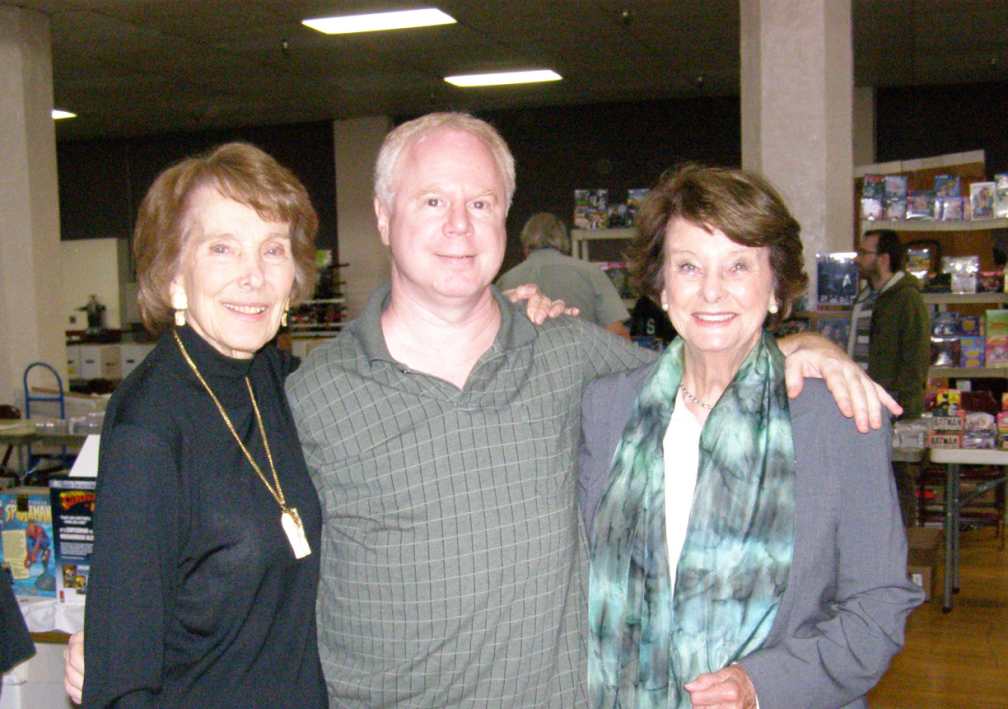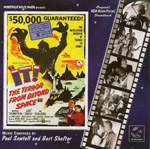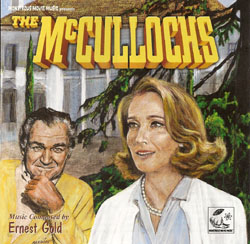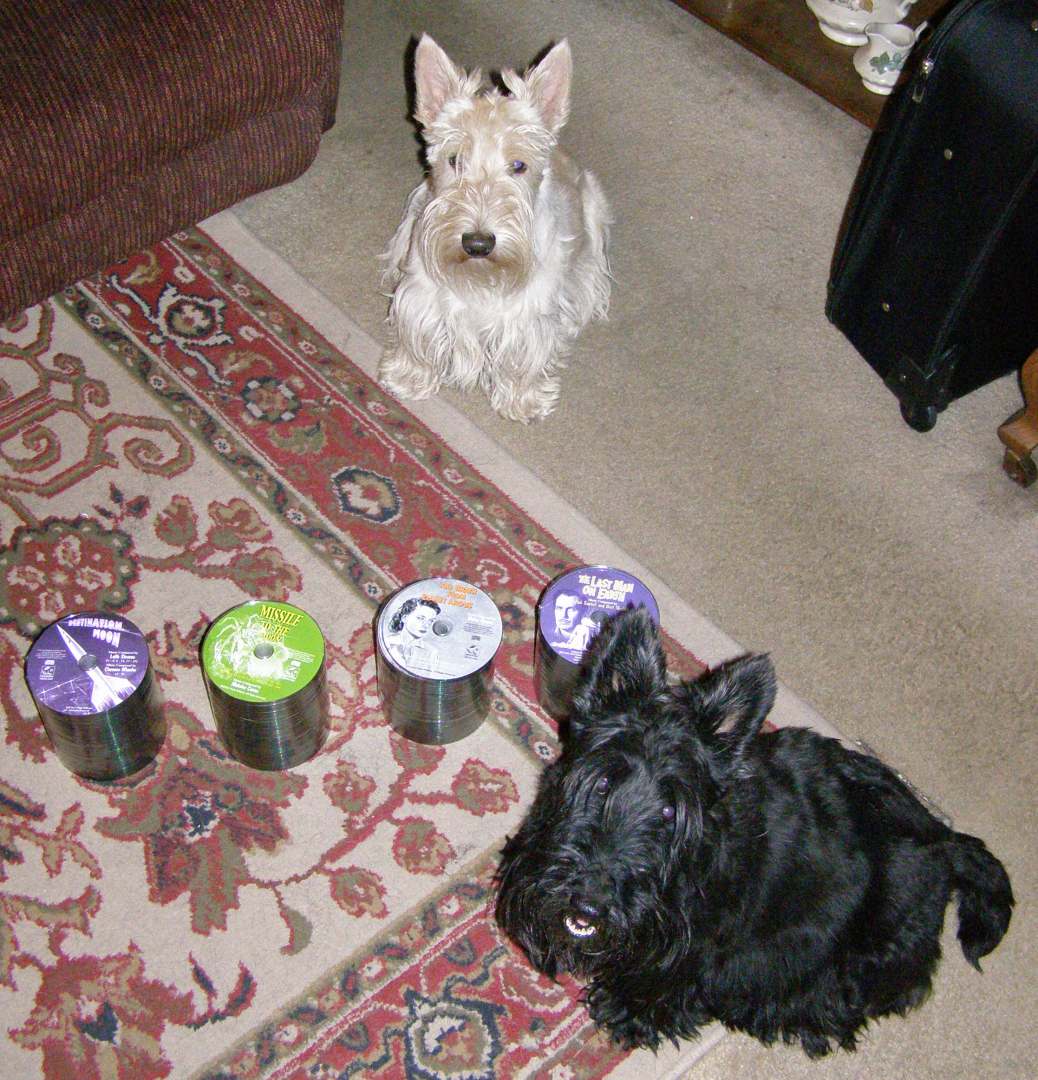An Interview with
David Schecter,
Album Producer

Left to right: Julie Adams, David Schecter, Audrey Dalton
Roger Hall (RH):
David, many fans have enjoyed your releases over the years. How did you and your wife get interested in producing CDs and forming Monstrous Movie Music?
David Schecter (DS):
There were two main factors. The first was that we were over at Warner Brothers' Music Library visiting a friend, and I was looking through the old conductor's books. I saw the music for films like THE BEAST FROM 20,000 FATHOMS, THEM!, and THE BLACK SCORPION, and it seemed bizarre that nobody had ever released and/or recorded any of that music -- music from the classic sci-fi films of the 1950s that I grew up with. The other event was going to a concert at The Hollywood Bowl where Henry Mancini was conducting a concert of his music. He performed about six minutes from CREATURE FROM THE BLACK LAGOON [Best of the Month, August 2000], and it was just magnificent, and the audience really loved it. It was so wonderful hearing the orchestral detail you couldn't pick up from watching the film with the scratchy old soundtrack containing dialogue and sound effects, and I thought the music deserved to be heard without all the distracting forces. A few of my friends were soundtrack producers, but they were all working on projects pertaining to the films that were important to them growing up, such as THE ADVENTURES OF ROBIN HOOD, KING KONG, and more famous and mainstream motion pictures. Well, movies like THE MOLE PEOPLE and THIS ISLAND EARTH and IT CAME FROM OUTER SPACE were the pictures that I grew up with -- that meant so much to me. And I felt the music was every bit as creative and enjoyable as that from the more prestigious pictures, so Katy and I decided to focus on these smaller pictures whose music was not always composed by the "big" composers that the other labels seemed to be focusing on.
RH:
How long did it take you to establish the company and issue your first CDs?
DS:
We decided to go ahead with things in 1994, and it took us less that two years to do everything we needed to do to get the first two releases out, that being to find the music, have my wife reconstruct it and create the scores and parts so it could be recorded, find a conductor, orchestra, get all the legal permissions needed, research and write the liner notes, find an artist and layout person to work on the books, find a printer, CD replication plant, and about 100 other things one must do in order to have a functioning and hopefully profitable record label. But that entire time nobody was paying my wife or me a penny to do all the work, because we were the bosses. And we had to fund the recording project and handle all other aspects of running the label, including paying royalties, so it was an incredible investment from both a time and monetary standpoint.
RH:
Why did you choose to focus mostly on sci-fi soundtracks from the 1950s?
DS:
As I mentioned earlier, these were the films I loved growing up and still loved, although I mainly loved them as a kid because of the monsters and special effects. But due to my love of music, I eventually learned to love the movies for their underscore as well. I focused on the 1950s because my friend John Morgan was, along with mutual friend Bill Stromberg, covering some of the horror scores from the 1940s. I liked the movies from the 1950s better anyway, but the 1940s were in great hands with John and Bill, so that made it an easier decision to focus on the 1950s and eventually the 1960s a bit, too, as well as some other eras.
RH:
What is the process for getting the rights to these vintage soundtracks?
DS:
There's no simple answer. If you are re-recording music, you need different permission than if you're releasing original soundtrack recordings or any music tracks that somebody before you has recorded. And it's different if the music has already been released or if it's never had a music-only release (the music being released apart from the film). And it also differs if you're releasing music owned in some aspect by a movie studio or by a composer. And it again differs if you need access to studio music masters as opposed to if you already have access to the music recordings you wish to release. So far I have never needed to gain access to any music masters owned by a studio. Regardless of the type of recording you wish to release, you basically have to find out who actually owns the copyright on the music publishing and the master rights (legal rights to previously-recorded music masters), rather than just assuming that whoever claims ownership rights actually owns them. Once you have determined the real owners, you have to negotiate with them regarding royalties, fees, credits, length of term of the license, territory, and many other factors. It can be very complicated and you need to have lots of patience and detective skills.
RH:
Is it difficult to find who owns the rights to these soundtracks?
DS:
That depends entirely upon the particulars of the particular score you're interested in releasing. Sometimes finding the actual music scores and/or recordings is harder than finding out who owns the rights. Other times it's the other way around. Often it's hard finding out both of those things! Studios have often lost contracts from the past, or there is more than one party claiming music or other rights. There's no easy answer because each and every film score has its own history and/or legal entanglements.
RH:
Do you have a favorite soundtrack among the 18 releases you have released so far?
 DS:
DS:
I like most of what we've done for various reasons. I would say CREATURE FROM THE BLACK LAGOON, with THE ALLIGATOR PEOPLE and TARZAN is our best recording, and I'm proud of the liner notes. I think it's a fabulous release and was disappointed we didn't get a Grammy nomination for it, but in retrospect, nobody's likely to nominate a B-movie score that isn't associated with a famous orchestra or more famous composers. In terms of original soundtrack releases, I am very proud of IT! THE TERROR FROM BEYOND SPACE and our just-released THE BRAIN FROM PLANET AROUS. Both took ages to find the music, and the scores are rather unique and special to me. But above all, I'd say I'm most proud of the fact that we've released music by many composers whose work has never or seldom been offered by any other labels, such as Walter Greene, Nicholas Carras, Mischa Bakaleinikoff, Herman Stein, Irving Gertz, William Axt, Ralph Carmichael, Milton Rosen, Herschell Burke Gilbert, and others.
RH:
Have the actors (like Julie Adams), composers (like Herman Stein) and relatives (like the Ernest Gold family) been pleased with the favorable fan response to your CD releases ?

DS:
Yes. With almost no exceptions, the families, actors, and relatives have been thrilled with our releases and the respect and attention to detail we have brought to the works. This has been a focus for MMM since its inception -- that of getting others "involved" in our releases. Not in terms of funding anything, because my wife and I fund everything ourselves. But in terms of making them feel like they're a part of things and using their expertise to help with the liner notes and other aspects of production. Many of my best friends were and are a result of our releases, and even if our CDs hadn't been as warmly received as they have been by fans and critics, calling Julie Adams [starring in THE McCULLOCHS], Joyce Meadows, Herman Stein, Paul Dunlap, Irving Gertz, and others among my closest friends has been reward enough.
RH:
Being a composer, how does your wife (Kathleen Mayne) work with the vintage film music as well as
the re-recordings for your early releases?
DS:
She studied composition, orchestration and conducting both at a music conservatory as well as privately with her friend Ernest Gold and others. All of those disciplines were necessary for her to reconstruct the film scores where only sketches or abbreviated scores were available for our re-recordings. Her knowledge of orchestration enabled her to recreate the music as accurately as she was able to, and her conducting skills also entered into the equation when she had to conduct some of our music. Even on our original soundtrack releases, her musical knowledge helps with editing choices and fixes needed, as well as helping me with my liner notes when I have a question I can't answer, and when we don't have access to the written scores.
RH:
How do the new sci-fi soundtracks compare with the ones from the 1950s?
DS:
Too many modern scores sound to me like three parts "sound design" and one part composition. While there are many talented composers out there, I think that too often they are asked to recreate a sound already heard in previous scores or according to music used in the films' trailers. While there are some individual voices out there, too many times I hear those voices being stifled by having to provide just more of the same rather than a unique vision specific for the particular film they're working on. I will probably always prefer the older scores because the composers had to be much more creative due to the restrictions placed upon them (only one or two electronic instruments available at the most). Nowadays anyone can get any kind of sound by pushing a button, and while the scores sound modern and contemporary, as standalone music they often leave me uninvolved. Of course there are exceptions to the rule and not all classic film scores are brilliant, but I prefer the scores composed by the musicians who were trained in the first half of the 20th century just as I prefer Impressionist painters to many modern painters and the opera of Verdi's time than the opera of today. I think the majority of composers who wrote for films from the 1930s - 1970s had better and more extensive training and were more learned from a dramatic standpoint. They studied literature, opera, ballet, classical music, films, musicals, stage plays, jazz, Big Band, and so much more. Nowadays a lot of composers seem to be regurgitating things they heard in other movies or on TV. They wouldn't know Dickens from Shakespeare or Monet from Warhol. And I think that can diminution of influences can have an influential -- and not in a good way -- effect upon your writing. Again, I'm painting with a broad brush here, but when you compare the incredible knowledge that some of the Golden and Silver Age composers had with some of today's, there's just no comparison. If you're the sum of your influences, then the fewer and less diverse influences you have, your sum will be smaller.
RH:
What soundtracks are you considering for future releases?
DS:
Some more Ernest Gold, since he was both a friend and a client of mine. And we will be doing the first CD ever of Paul Dunlap's music, as Paul was another client and a dear friend for a long time. We pride ourselves on releasing music from people that few people have heard of and scores that few people ever thought would get released.
RH:
Do you have any advice for would-be record producers or record company execs?
DS:
Have your head examined. It's lots of work, lots of money, lots of headaches, and the record business isn't what it used to be in terms of making profits. You have to love what you're doing because you'll never earn enough money to help you with your retirement plans!
RH:
Thank you for the interview, David.

Read the review of these MMM CDs:
THE BRAIN FROM PLANET AROUS and TEENAGE MONSTER
- music by Walter Greene
DESTINATION MOON - music by Leith Stevens,
Please help support
Film Music Review
Order CDs from the
American Music Recordings Collection (AMRC)

Film Music Review (Home Page)
Return to top of page